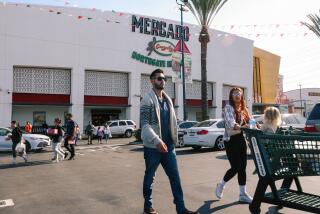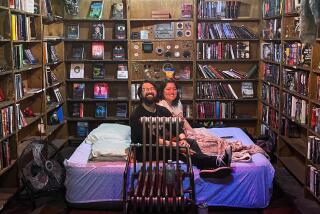Subversive Swedes Dismantle His World
- Share via
An insidious foe has invaded my space.
After driving to work for 15 years and encountering nothing more troublesome than the occasional deranged soccer mom in a van, I was stopped dead in my tracks this week, two blocks from the office. The reason: the opening of a gigantic IKEA store across the street that lured thousands of people into the neighborhood.
What for years had been an empty field reminiscent of those in Nebraska where I’d kick up dirt clods on the way to school while chatting with the wrens and robins now is a huge home furnishings center and sure to become a car magnet and traffic nightmare.
To IKEA and Costa Mesa: What profiteth a man who buys a chair but loses his own soul?
I’d watched the construction over the months. From our side of South Coast Drive, its gray outer shell looked like a prison. Only from the San Diego Freeway does the inviting blue-and-yellow lettering beckon the unsuspecting. Now, it’s here. Any day, I expect it to storm our gates and take us all hostage.
Here’s the kind of people we’re dealing with: Under the guise of niceness because its founder was Swedish, IKEA not only wants you to buy furniture, it expects you to assemble it at home. I can’t make my bed, much less a bookcase.
Costa Mesa could have put up a nice little strip mall with ice cream shops and restaurants.
But, no, they had to collaborate with a foreign power and create a permanent reminder of my incompetence. Every day as I near the office, IKEA will remind me I salvaged a C in ninth-grade shop class only because my dad was school superintendent.
Self-assembly? What kind of people are these? JCPenney doesn’t sell you the yarn and expect you to make your own socks.
Company propaganda on its Web site says IKEA operates in some 30 countries and was founded by Ingvar Kamprad. He was raised “on a farm called Elmtaryd, near the small village of Agunnaryd.”
Didn’t know that, but then the pieces fit: Ingvar. Kamprad. Elmtaryd. Agunnaryd.
Now fully aware of their cleverness, I infiltrated enemy lines. Security people were everywhere. I asked a white-haired lady leaving the store what it was like inside: “Madhouse,” she replied.
Once inside, the first thing I saw were three guys playing a jazzy tune on guitars and piano. Obviously, they’d been planted to seduce people.
Touring the facility heightened my suspicions. It’s a mysterious operation that has signs with code words like Duktig, Kaxas and Fargglad. To throw you off, they also offer a bookcase named Billy. I asked one of their operatives about it. “The Billy is one of the simplest things we have to build,” he said. “Six screws on one side and some nails in the back.”
High school. Industrial arts class in the basement. Under step-by-step supervision from the teacher, I finished a bookcase, but not before nearly slicing off my finger on a band saw.
The IKEA store is expected to bring in about $1.5 million in annual sales tax revenue to the Vichy government of Costa Mesa. Walking through it is like strolling through a small town, with side roads and alleyways leading you past chairs and clocks and pots and sofas and -- it must be said -- an incredible amount of wicker.
In one nook of the store, a young man was getting some “body art” applied to his shoulder. A good reporter would have asked him why he decided to get tattooed in a Swedish furniture store, but I didn’t. The store also plans to offer a kennel for the shoppers’ dogs.
Orange County, don’t be fooled. Sure, they seem like nice folks, but don’t you realize how subversive all of this is?
*
Dana Parsons’ column appears Wednesdays, Fridays and Sundays. He can be reached at (714) 966-7821, at dana.parsons@latimes.com or at The Times’ Orange County edition, 1375 Sunflower Ave., Costa Mesa, CA 92626.


